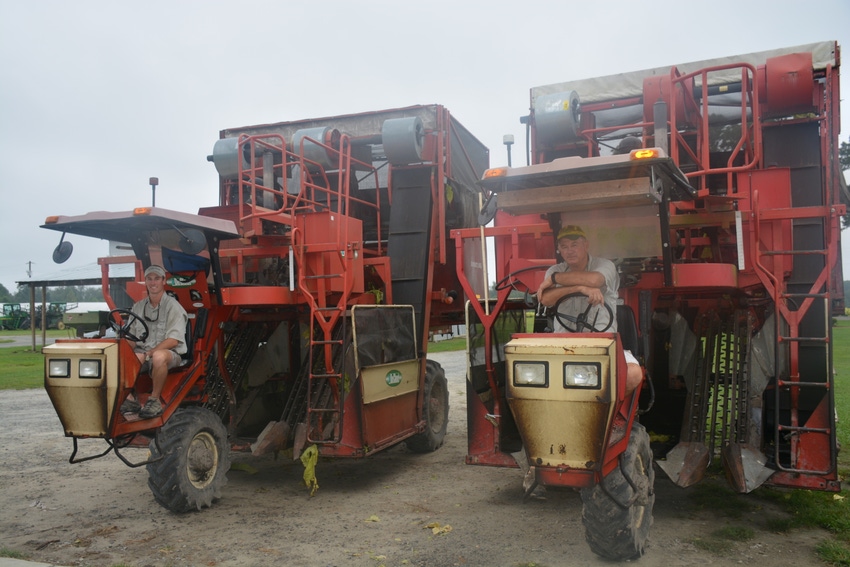
This year marks the 40th anniversary of Steve Griffin’s return to the family farm in Beaufort County North Carolina. Much has changed in farming since 1974, but one constant is the importance of efficiency.
It’s a lesson Griffin has taught to son Archie, who returned to the farm three years ago after completing a degree in soil science and crop production at North Carolina State University in Raleigh. “Ever since I came back, Dad has stressed the more efficient you are with your farm, the more you get out of it. You can always better your farm by being more efficient,” Archie says.
The Griffins farm six miles north of Washington in Beaufort County, where sandy soils have always been a challenge. A key to efficiency is incorporating new technology. The Griffins say it’s a must for controlling costs.
“Technology hasn’t made farming easy, but it’s made it easier,” Steve says. “Our soils haven’t changed. The technology we are using is what has changed.”
When Archie returned he suggested they install John Deere GreenStar precision technology on their tractors. It’s been vital for controlling costs and improving efficiency, Archie says. “GPS allows us to get more precise in planting, spraying and harvesting,” Archie says. “It’s made us more efficient.”
Tobacco is still the money crop for the Griffins with 240 acres planted this year. But corn, soybeans and wheat have always been an important part of the operation. The Griffins farm 700 acres of wheat double cropped with soybeans and 500 acres of corn. It’s been a combination that works for them.
Throughout the years, tobacco has always been the most challenging crop to produce. “This year has been very wet,” Steve says. “Tobacco doesn’t like a lot of water, so it’s been tough. Anytime you farm it’s a challenge, but grain farming is still not as much a challenge as tobacco is.”
With their sandy soils, the Griffins don’t make the bin busting grain yields that many farmers in the black lands of North Carolina achieve, but a well- managed fertility programs allows them to make good yields. No till and a well-timed fungicide program help, Steve says. Moreover, the development of stress tolerant hybrids and varieties have really helped the Griffins improve their yields over the years.
Steve says they average 40 to 50 bushels per acre on soybeans, 125 bushels per acre on corn and 65 bushels per acre on wheat.
Want access to the very latest in agriculture news each day? Subscribe to Southeast Farm Press Daily. It’s free!
The Griffins plant corn, wheat and soybeans for rotation with tobacco. “Wheat works well for us because it’s a spring, early summer harvest. We can then get our wheat out and double crop our beans,” Steve says.
Soil sampling is critical in their nitrogen fertility program. “If we see a problem, we will also use tissue sampling,” Steve says. On average, they’ll apply 120 pounds of nitrogen to their grain crop when it follows tobacco production. “When planting wheat behind tobacco, there are more fertilizers present in the soil index, therefore a lower amount of fertilizers is needed,” Steve says.
Stress-tolerant and drought tolerant varieties and hybrids are critical for farming non-irrigated sandy soils, the Griffins stress. An important part of their operation is producing seed for other North Carolina grain producers.
Landlord relations critical
Weather and low commodity prices are a challenge, but Steve says labor has never a been a problem on the farm. “We’ve been mighty fortunate on our labor situation. We’ve had the same employees for 16 years and they do a great job for us. Labor has never been a challenge for us,” Steve says.
The Griffins farm roughly 1,500 acres, a portion of this they own, with the a majority of the land being rented. Working with landowners and keeping them informed is critical. It requires people skills and effective public relations. “We have some good landowners and Archie is a good PR and people person. He keeps them informed,” Steve says.
And Archie adds, “Your landowners want to know that you care about them. Some of our landowners are former farmers so they are always interested in what we’re doing.”
Steve believes it’s important to stay involved which is why he is active in policy development for the North Carolina Farm Bureau. He is active in the Tobacco Growers Association of North Carolina, serving on the board. He’s also president of the North Carolina Small Grain Growers Association which keeps him busy.
The association is a nonprofit corporation formed to encourage, promote and develop more efficient and effective small grain marketing and production and to participate in all matters relative to the interests of small grain producers. Support of research is a critical job, Steve says.
As for Archie, he’ll be enrolling in the MBA program at East Carolina University in nearby Greenville this fall. He’ll take classes online and at night while he keeps working on the farm. Archie believes the MBA will help him with the all-important goal of improving efficiency on the farm.
“It will allow me to learn not just about the farm business, but business at a global scale.
Rod Gurganus, the Griffin’s Extension agent in Beaufort County, agrees with the importance of efficiency in farming. He says the Griffins are successful because they are efficient managers. “You have to make the most of what you have. You have to get what you can from every acre and that’s exactly what they do,” Gurganus says.
About the Author(s)
You May Also Like






